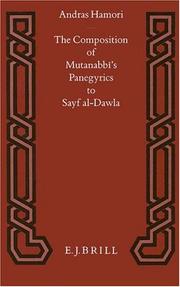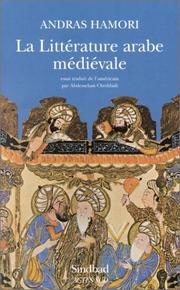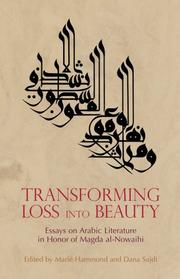| Listing 1 - 10 of 12 | << page >> |
Sort by
|

ISSN: 01699903 ISBN: 9004093664 9789004093669 900466307X 9789004663077 Year: 1992 Volume: 14 Publisher: Leiden ;Boston Brill
Abstract | Keywords | Export | Availability | Bookmark
 Loading...
Loading...Choose an application
- Reference Manager
- EndNote
- RefWorks (Direct export to RefWorks)
Mutanabbī, Abū al-Ṭayyib Aḥmad ibn al-Ḥusayn, --- Sayf al-Dawlah al-Ḥamdānī, ʻAlī ibn ʻAbd Allāh, --- Criticism and interpretation --- In literature --- Mutanabbi, Abu al-Tayyib Ahmad ibn al-Husayn --- -Criticism and interpretation --- Abū al-Ṭaiyib Aḥmad ibn al-Ḥusain al Mutanabbī, --- Abū al-Ṭayyib al-Mutanabbī, --- Abu Tayyib Ahmad ibn al Husain al Mutanabbi, --- Aḥmad ibn al-Ḥusayn al-Mutanabbī, --- Al-Mutanabbi, --- Motanabbî, --- Motenebbi, --- Mutanabbī, Abū al-Ṭaiyib Aḥmad ibn al-Ḥusain, --- Mutanabbī, Abū al-Ṭayyib, --- Mutanabbi, Abu Tayyib Ahmad ibn al Husain, --- Mutanabbī, Aḥmad ibn al-Ḥusayn, --- ابو الطيب احمد بن الحسين المتنبي --- المتنبي --- المتنبي، أبو الطيب أحمد بن الحسين، --- المتنبي، ابو الطيب احمد بن الحسين --- متنبي، أبو الطيب أحمد ابن الحسين --- متنبي، أبو الطيب أحمد الحسين، --- متنبي، أبو الطيب أحمد بن الحسين --- متنبي، أبو الطيب أحمد بن الحسين، --- متنبي، ابو الطيب أحمد --- متنبي، ابو الطيب احمد الحسين --- متنبي، ابو الطيب احمد بن الحسين، --- متنبي، ابو الطيب محمد بن الحسين، --- متنبى، أبو الطيب أحمد بن الحسين، --- متنبى، ابوالطيب احمد بن الحسين --- متنبى، ابى الطيب احمد بن الحسين --- Criticism and interpretation. --- In literature. --- Mutanabbī, Abū al-Ṭayyib Aḥmad ibn al-Ḥusayn, - 915 or 916-965 - Criticism and interpretation --- Sayf al-Dawlah al-Ḥamdānī, ʻAlī ibn ʻAbd Allāh, - 915 or 916-967 - In literature --- Mutanabbī, Abū al-Ṭayyib Aḥmad ibn al-Ḥusayn, - 915 or 916-965 --- Sayf al-Dawlah al-Ḥamdānī, ʻAlī ibn ʻAbd Allāh, - 915 or 916-967
Book
ISBN: 0691062641 0691645361 1400869358 Year: 2015 Publisher: Princeton, NJ : Princeton University Press,
Abstract | Keywords | Export | Availability | Bookmark
 Loading...
Loading...Choose an application
- Reference Manager
- EndNote
- RefWorks (Direct export to RefWorks)
In applying the standards of modern literary criticism to medieval Arabic literature, Andras Hamori concentrates on those aspects of the literature that appear most alien to modern Western taste: the limitation of themes, the sedimentation with conventions, and the use of elusive patterns of composition.The first part of the book approaches Arabic literature from the historical point of view, concentrating on the transformations in poetic genres and poetic attitudes towards time and society in the literature between the sixth and the tenth centuries. The problems of poetic technique are then discussed, with special emphasis on poetic unity and the use of conventions. The third part of the book deals with methods of composition in prose through an examination of the orders and disorders in two tales from the Arabian Nights.Originally published in 1974.The Princeton Legacy Library uses the latest print-on-demand technology to again make available previously out-of-print books from the distinguished backlist of Princeton University Press. These editions preserve the original texts of these important books while presenting them in durable paperback and hardcover editions. The goal of the Princeton Legacy Library is to vastly increase access to the rich scholarly heritage found in the thousands of books published by Princeton University Press since its founding in 1905.
Arabic poetry --- Civilization, Medieval, in literature. --- History and criticism. --- Civilization, Medieval, in literature --- History and criticism --- Arabian nights. --- Hikajat 1001 malem --- Hikayat 1001 malem --- Hikajat sariboe satoe malem --- Sariboe satoe malem --- Seribu satu malam --- Sen-ichiya monogatari --- Gafu issen ichiya monogatari --- Alf laylah wa-laylah --- Thousand nights and one night --- Thousand and one nights --- Alif laila --- Tysi︠a︡cha i odna nochʹ --- Tausendundeine Nacht --- Tisíc a jedná noc --- Hikayat sa-ribu satu malam --- I chʻien ling i yeh --- Book of the thousand nights and one night --- Mille et une nuits --- Book of a thousand nights and a night --- Thousand nights and a night --- Elef lailah ṿe-lailah --- Tales of the Arabian nights --- 1001 Nacht --- Mille e una notte --- Arabiyan naito --- One thousand and one nights --- 1001 nights --- Arabian nights entertainments --- Hazar ew mēk gisherner --- Cartea celor o mie și una nopți --- Mie și una nopți --- Cartea celor o 1001 nopți --- Elf leyle ve leyle --- Alf sakhar ve sakhar
Book
ISBN: 1400869358 9781400869350 9780691618364 0691618364 Year: 2015 Publisher: Princeton, NJ
Abstract | Keywords | Export | Availability | Bookmark
 Loading...
Loading...Choose an application
- Reference Manager
- EndNote
- RefWorks (Direct export to RefWorks)
In applying the standards of modern literary criticism to medieval Arabic literature, Andras Hamori concentrates on those aspects of the literature that appear most alien to modern Western taste: the limitation of themes, the sedimentation with conventions, and the use of elusive patterns of composition.The first part of the book approaches Arabic literature from the historical point of view, concentrating on the transformations in poetic genres and poetic attitudes towards time and society in the literature between the sixth and the tenth centuries. The problems of poetic technique are then discussed, with special emphasis on poetic unity and the use of conventions. The third part of the book deals with methods of composition in prose through an examination of the orders and disorders in two tales from the Arabian Nights.Originally published in 1974.The Princeton Legacy Library uses the latest print-on-demand technology to again make available previously out-of-print books from the distinguished backlist of Princeton University Press. These editions preserve the original texts of these important books while presenting them in durable paperback and hardcover editions. The goal of the Princeton Legacy Library is to vastly increase access to the rich scholarly heritage found in the thousands of books published by Princeton University Press since its founding in 1905.
Civilization, Medieval, in literature. --- Arabic poetry --- History and criticism. --- Arabian nights. --- Hikajat 1001 malem --- Hikayat 1001 malem --- Hikajat sariboe satoe malem --- Sariboe satoe malem --- Seribu satu malam --- Sen-ichiya monogatari --- Gafu issen ichiya monogatari --- Alf laylah wa-laylah --- Thousand nights and one night --- Thousand and one nights --- Alif laila --- Tysi︠a︡cha i odna nochʹ --- Tausendundeine Nacht --- Tisíc a jedná noc --- Hikayat sa-ribu satu malam --- I chʻien ling i yeh --- Book of the thousand nights and one night --- Mille et une nuits --- Book of a thousand nights and a night --- Thousand nights and a night --- Elef lailah ṿe-lailah --- Tales of the Arabian nights --- 1001 Nacht --- Mille e una notte --- Arabiyan naito --- One thousand and one nights --- 1001 nights --- Arabian nights entertainments --- Hazar ew mēk gisherner --- Cartea celor o mie și una nopți --- Mie și una nopți --- Cartea celor o 1001 nopți --- Elf leyle ve leyle --- Alf sakhar ve sakhar
Book
ISBN: 900466307X Year: 1992 Publisher: Leiden, The Netherlands : E. J. Brill,
Abstract | Keywords | Export | Availability | Bookmark
 Loading...
Loading...Choose an application
- Reference Manager
- EndNote
- RefWorks (Direct export to RefWorks)
The purpose of this study is to identify and describe recurrent patterns of composition in the twenty two major panegyrics Mutanabbī wrote to Sayf al-Dawla during his stay at the ḥamdānid court in Aleppo between 337/948 and 345/956. It discusses the types of utterance used in endings and in cadential lines before definable internal boundaries, the organising conventions of the passages that lead into and out of chronicles of military campaigns, the non-random placement of certain crescendo motifs, various means of local organisation in poems without events, etc. It also considers brief differences in technique between the Aleppo period and Mutanabbī's earlier and later work, and casts a glance at possible predecessors. Based on a sizable and coherent sample of poetry, this study demonstrates that compositional rules and predilections played a pervasive role in Mutanabbī's writing in the years when his career was at its height.
Digital
ISBN: 9781400869350 9780691618364 Year: 2015 Publisher: Princeton, N.J. Princeton University Press
Abstract | Keywords | Export | Availability | Bookmark
 Loading...
Loading...Choose an application
- Reference Manager
- EndNote
- RefWorks (Direct export to RefWorks)

ISBN: 2742737308 9782742737307 Year: 2002 Publisher: Arles: Sindbad,
Abstract | Keywords | Export | Availability | Bookmark
 Loading...
Loading...Choose an application
- Reference Manager
- EndNote
- RefWorks (Direct export to RefWorks)
Arabic poetry --- Arabic literature --- Civilization, Medieval, in literature. --- Poésie arabe --- Littérature arabe --- Civilisation médiévale dans la littérature --- History and criticism --- Histoire et critique --- Mille et une nuits --- Poésie arabe --- Littérature arabe --- Civilisation médiévale dans la littérature --- Arabian nights.
Book
ISBN: 9781400843510 Year: 2022 Publisher: Princeton, NJ
Abstract | Keywords | Export | Availability | Bookmark
 Loading...
Loading...Choose an application
- Reference Manager
- EndNote
- RefWorks (Direct export to RefWorks)
Book
ISBN: 9783447111164 344711116X Year: 2019 Publisher: Wiesbaden : Harrassowitz Verlag,
Abstract | Keywords | Export | Availability | Bookmark
 Loading...
Loading...Choose an application
- Reference Manager
- EndNote
- RefWorks (Direct export to RefWorks)
Arabic literature --- History and criticism --- Hamori, Andras,


ISBN: 1617971650 1936190257 9774161025 Year: 2008 Publisher: American University in Cairo Press
Abstract | Keywords | Export | Availability | Bookmark
 Loading...
Loading...Choose an application
- Reference Manager
- EndNote
- RefWorks (Direct export to RefWorks)
Multi

ISBN: 9781474485531 9781474485500 Year: 2022 Publisher: Edinburgh Edinburgh University Press
Abstract | Keywords | Export | Availability | Bookmark
 Loading...
Loading...Choose an application
- Reference Manager
- EndNote
- RefWorks (Direct export to RefWorks)
| Listing 1 - 10 of 12 | << page >> |
Sort by
|

 Search
Search Feedback
Feedback About UniCat
About UniCat  Help
Help News
News